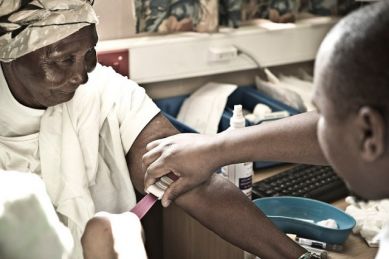South African Christian hospital with biggest HIV program to close

The apartheid regime could not close the hospital down.
But Christian-run McCord Hospital, in the Indian Ocean port city of Durban that runs South Africa's biggest HIV care and treatment program, has announced it will close after its government subsidy ends.
The 142-bed hospital was founded by U.S. missionary surgeon, Dr. James McCord, who opened it in 1909 to provide medical care to the Zulu people.
McCord is one the biggest hospitals in KwaZulu-Natal (KZN) province and it played a role in the training of predominantly black doctors, nurses and midwives during the apartheid years.
"On the March 31, 2013, the grant funding received from the Department of Health will come to an end," Kevin Smith McCord chief executive officer wrote on the hospital's website.
"McCord has not received notification of an intention to renew this funding. As a result of the loss of this grant funding, McCord loses its license to operate as a State-aided hospital and cannot afford to continue operating," said Smith.
In October, McCord produced 225 graduates in nursing, primary health care and midwifery.
The hospital has three operating theaters, a day surgery ward, an outpatient department seeing an average of 15,000 people each month and support services such as pharmacy, laboratory and X-Ray.
McCord's comprehensive HIVcare and treatment program has started more than 8,000 people on special treatment, including over 1,000 children. The hospital's prevention of mother to child transmission (PMTCT) program boasts one of the lowest HIV transmission rates in South Africa, at just 2.5 percent.
Durban's Mercury newspaper reported on Monday that the hospital received a received a subsidy of 89.3 million rands (10 million U.S. dollars) from the health department in 2012.
The newspaper reported the hospital was informed in October there would be a reduction in government funding, but was not told when the complete cut in funding would take place. It had tried to move towards a private model, but this required more funds and a private license.
Reports said the hospital has turned down a proposal for the government to take over the hospital at the time when many State-run hospitals are said to be floundering.
"It is clear that many healthcare institutions are crumbling, like (Durban's) Addington hospital, St. Benedictine hospital and now the speculation of closure of McCord hospital," said Usha Roopnarain, who represents the opposition Inkatha Freedom Party in the KZN provincial assembly.
She noted, "What we see is not the progressive realization of healthcare, rather it is an absolute deterioration of healthcare," said Roopnarain referring to the governing African National Congress's healthcare policy.
McCord has historically played a crucial role in the training of doctors, nurses and midwives, the majority of whom have been black South Africans.
It afforded them opportunities denied elsewhere in the country, particularly in the 1930s and 1940s.
The McCord School of Nursing has trained nurses since 1924, and currently graduates 190 nurses a year. Its medical internship program provides training for 8-12 doctors each year.
"Despite 10 threats of closure during the apartheid era, McCord Hospital has grown consistently over the last 100 years and provides top quality, affordable healthcare for all," says the hospital's Facebook page.
"Please tell me that the hospital is not closing, sad for days," said Tholakele Xaba.
Stefanus Snyman wrote on the hospital's Facebook, "We think and pray for McCord in this most trying time! Believe in miracles!"
Nico Fameliaris said, "It's time that you got public sector funding from people to keep the hospital alive."